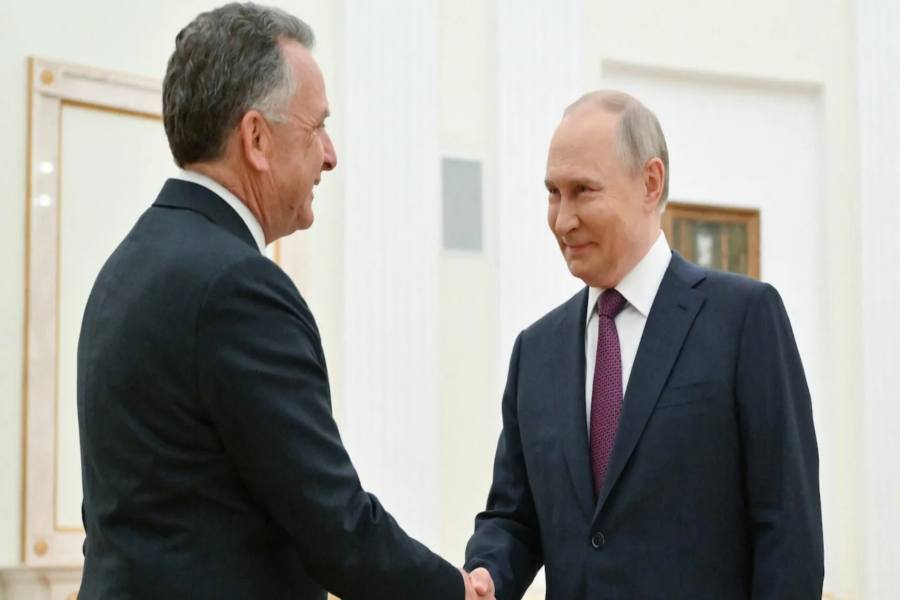Russian military officials announced Saturday that all Ukrainian troops have been expelled from the Kursk region, marking a significant shift in the conflict’s frontline amid ongoing high-level negotiations over a potential ceasefire.
During a video conference with President Vladimir Putin, Russia’s Chief of the General Staff, Valery Gerasimov, reported that the last Ukrainian-controlled settlement, the village of Gornal, had been retaken. “Today, the last settlement in the Kursk region, the village of Gornal, has been liberated from Ukrainian forces,” Gerasimov told Putin, according to Agence France-Presse (AFP). Putin, in turn, congratulated Russian forces, declaring Ukraine’s incursion into Russian territory a “complete failure” and asserting that this victory creates “the right conditions for further successes” elsewhere along the front.
Ukrainian officials have not confirmed Russia’s claims. In contrast, Ukraine’s General Staff insisted in its Saturday morning update that its forces continue to resist Russian advances in the Kursk sector, pushing back against any assertion that they had been fully expelled.
Background: Ukraine’s Bold Push Into Russian Territory
Ukraine’s initial advance into the Kursk region in August 2024 surprised many, including its Western allies, capturing roughly 500 square miles of Russian territory. Kyiv had hoped that gaining a foothold inside Russia would strengthen its bargaining position in any future ceasefire negotiations. However, over the past several months, Russian forces have gradually retaken most of that territory, culminating in the reported recapture of Gorlovka.
The loss of Ukrainian-held ground near Kursk now shifts the conflict’s pressure onto Ukraine’s northern Sumy region, which borders Kursk. Russian forces appear positioned to increase their military pressure there, signaling potential new threats for Ukrainian defense planners.
North Korean Troops Confirmed to Be Fighting in Russia
In a significant new development, Gerasimov also confirmed that North Korean troops participated in combat operations alongside Russian forces during the Kursk fighting. Praising their “professionalism, courage, and heroism,” Gerasimov’s admission marks the first official Russian acknowledgment of North Korean boots on the ground.
Western intelligence agencies and Ukrainian officials had previously warned that Pyongyang deployed between 10,000 and 12,000 soldiers to assist Moscow — claims that had been met with vague responses from both Russian and North Korean authorities until now. Previously, both nations had only emphasized their “lawful military cooperation” without explicitly acknowledging troop deployments.
Diplomatic Efforts: Ukraine, U.S., and Russia Edge Toward Ceasefire Talks
As military developments unfolded, diplomatic activities continued on the global stage. In Vatican City, U.S. President Donald Trump and Ukrainian President Volodymyr Zelenskyy held a private meeting Saturday following the funeral of Pope Francis. Ukrainian presidential spokesman Serhii Nykyforov described the roughly 15-minute conversation as positive, noting that both leaders agreed to continue discussions later that day.
White House Communications Director Steven Cheung confirmed the meeting, describing it as “very productive.”
The diplomatic activity followed U.S. Middle East Envoy Steve Witkoff’s meeting with Putin on Friday, after which Trump suggested that Russia and Ukraine were “very close to a deal.” Russian Foreign Minister Sergey Lavrov echoed that optimism during a “Face the Nation” interview, stating that the Kremlin is “ready to reach a deal” but that some issues still needed “fine-tuning.”
Meanwhile, Zelenskyy emphasized the urgency of securing a ceasefire, stating Friday night that “real pressure on Russia” was necessary to achieve either an American or Ukrainian-backed proposal that could immediately stop hostilities and lead to a “dignified peace” with reliable security guarantees.
Why This Matters
The developments in Kursk and the simultaneous diplomatic overtures highlight a pivotal moment in the ongoing conflict. Russia’s consolidation of territory, paired with the first formal acknowledgment of North Korean involvement, could shift military dynamics, while the parallel diplomatic efforts suggest that the parties may be closer than ever to negotiating at least a temporary halt to hostilities.
However, key questions remain:
- Will Russia’s battlefield momentum harden its stance at the negotiating table?
- Can the U.S. broker a deal that satisfies both Moscow’s security demands and Ukraine’s territorial integrity?
- Will North Korea’s direct involvement provoke broader international consequences?
As negotiations continue, the coming days could prove decisive not only for Ukraine’s immediate future but for the stability of the broader region.
